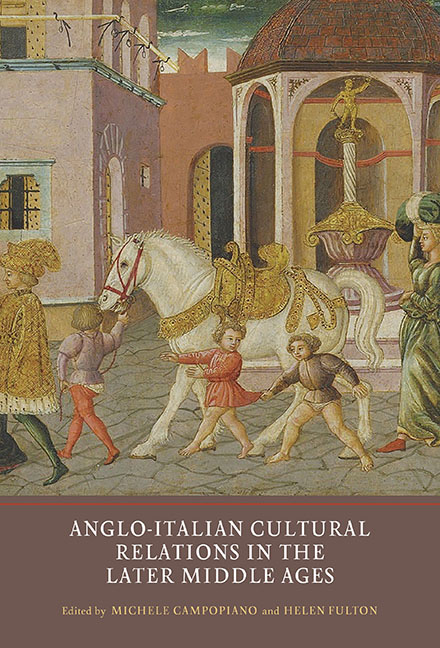Book contents
- Frontmatter
- Contents
- List of Illustrations
- List of Contributors
- Acknowledgements
- List of Abbreviations
- Introduction: Historical and Literary Connections between Britain and Italy in the Middle Ages
- 1 Writing, Translating and Imagining Italy in the Polychronicon
- 2 Richard de Bury, Petrarch and Avignon
- 3 The Reception of Italian Political Theory in Northern England: Bartolus of Saxoferrato and Giles of Rome in York
- 4 Italian Firms in Late Medieval England and their Bankruptcy: Re-reading an Old History of Financial Crisis
- 5 ‘Nostri Fratelli da Londra’: The Lucchese Community in Late Medieval England
- 6 ‘Saluti da Londra’: Italian Merchants in the City of London in the Late Fourteenth and Early Fifteenth Centuries
- 7 Political Joachism and the English Franciscans: The Rumour of Richard II's Return
- 8 Urban History in Medieval and Early Modern Britain: The Influence of Classical and Italian Models
- Afterword: The Nature of Anglo-Italian Cultural Exchanges
- Bibliography
- Index
8 - Urban History in Medieval and Early Modern Britain: The Influence of Classical and Italian Models
Published online by Cambridge University Press: 03 July 2019
- Frontmatter
- Contents
- List of Illustrations
- List of Contributors
- Acknowledgements
- List of Abbreviations
- Introduction: Historical and Literary Connections between Britain and Italy in the Middle Ages
- 1 Writing, Translating and Imagining Italy in the Polychronicon
- 2 Richard de Bury, Petrarch and Avignon
- 3 The Reception of Italian Political Theory in Northern England: Bartolus of Saxoferrato and Giles of Rome in York
- 4 Italian Firms in Late Medieval England and their Bankruptcy: Re-reading an Old History of Financial Crisis
- 5 ‘Nostri Fratelli da Londra’: The Lucchese Community in Late Medieval England
- 6 ‘Saluti da Londra’: Italian Merchants in the City of London in the Late Fourteenth and Early Fifteenth Centuries
- 7 Political Joachism and the English Franciscans: The Rumour of Richard II's Return
- 8 Urban History in Medieval and Early Modern Britain: The Influence of Classical and Italian Models
- Afterword: The Nature of Anglo-Italian Cultural Exchanges
- Bibliography
- Index
Summary
Relatively little has been written about urban history as a medieval genre in Britain, mainly because there are few examples of chronological histories of individual towns in Britain before the late seventeenth century. This chapter makes a new contribution to medieval urban historiography by proposing a redefinition of what urban history was and what forms it took in medieval Britain, and by arguing that there has in fact been a continuous, if diverse, tradition of urban history from Bede to the modern period. In presenting the evidence for a continuous tradition, the chapter takes a new look at the influence of classical and Italian urban historical genres on British writing, particularly the genre of chorography, which is repositioned here as a form of urban history.
By ‘urban history’ I mean a diachronic historical survey of a town or city over a period of time – not simply synchronic studies of a town or aspects of urban life at particular historical moments. As a modern genre, the diachronic type of urban history in the form of civic or municipal histories of individual towns and cities is essentially an eighteenth- century phenomenon in Britain. The emergence of chronological histories of British towns can be linked to a move towards increased autonomy in urban governance, the growth of commerce and trade and the development of distinctive civic identities in the larger towns. With the growth of tourism, urban histories were commodified to appeal both to the citizens of the town and to the outsiders who might choose to visit it. From the twentieth century, urban history has been absorbed into, or rather overshadowed by, a wider field of urban studies which concerns itself particularly with economics, planning, population growth, demographics and geographies of urban space. Yet urban history, as distinct from the social history of urban life, retains its distinctiveness in producing accounts of the city as a ‘historicized subject’: ‘The urban historian considers the multiple variables that together constitute the city as both a historicized subject and an object for historical study. The city is thus accorded an agency in its own construction and synthesis.’
- Type
- Chapter
- Information
- Anglo-Italian Cultural Relations in the Later Middle Ages , pp. 150 - 178Publisher: Boydell & BrewerPrint publication year: 2018

